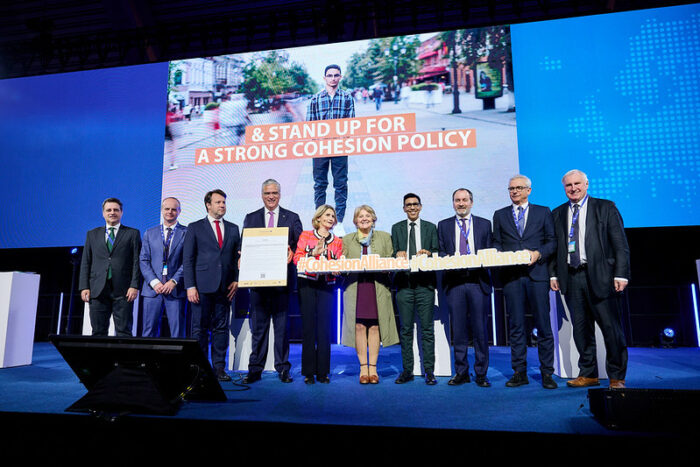The Progressive Post
Europe’s socio-ecological transformation requires a very different industrial plan
Today’s reality can increasingly be described as a polycrisis: the Covid-19 pandemic and the subsequent disruption of global supply chains; the war in Ukraine and the resulting fossil fuel price crisis; rising inequalities between and within countries, exacerbated by inflation; and, of course, climate change. We need to transform our economy to make it resilient to shocks and respectful of planetary boundaries, and we need to reduce inequalities. The Green Deal Industrial Plan (GDIP) must be part of that socio-ecological transformation rather than a plan that mostly, and blindly, funds the industry.
The GDIP was adopted in February 2023 to respond to the US Inflation Reduction Act (IRA). It is a large investment plan in energy and climate action, framed as an attempt to make Europe’s clean tech and green industry competitive. It proposed upcoming legislation on critical raw materials and on a net-zero industry, and financial support to green industries.
However, it is important to take a step back and question some of the underlying assumptions behind these proposals. It is important to boost the production of clean technologies in Europe that are indispensable for decarbonising and transforming our economy. This will help reduce our dependence on imports that are exposed to disruptions (as it has happened during the pandemic) and to geo-political turmoil – from the war in Ukraine to the Sino-US trade war. It is also clear that Europe needs to accelerate the transformation of the industry so that it significantly reduces its greenhouse gas emissions, as well as its appetite for material resources (raw materials, water, energy). The latter – what we call a ‘sufficiency agenda’ – is unfortunately completely absent from the GDIP.
Transforming our industry will require a smart mix of regulation and funding – and not just providing public funds and subsidies to industries.
Changing regulation is crucial for changing industrial practices. For example, regulation is needed to shift private finance towards genuinely green activities, in turn reducing the need for extensive public subsidies. Eco-design regulations are necessary to ensure products are designed with recycling, reuse and life extension of products in mind. Ensuring a favourable environment for a circular economy requires a mix of targeted tax measures, recycling obligations, or bans on programmed obsolescence. Regulation is also needed for adopting binding reduction targets for using material resources; for banning the use of highly polluting and socially harmful luxury items such as SUVs or private jets; and for making investors and corporations accountable for their climate impacts. Finally, the long overdue phase-out of fossil fuel subsidies is needed to enhance the relative competitiveness of clean economy sectors, starting from banning the free allocation of pollution certificates to specific industries in the Emission Trading System.
Additional public finance will be needed too to fund the socio-ecological transition, and the transformation of our economy and energy systems in particular. This is why the Commission is proposing three things as part of the GDIP: a reshuffling of existing EU funding streams, a relaxation of State aid rules and a new EU fund (sovereignty fund). Most of the funding gaps will have to be met by private finance. However, public finance has a crucial role to play when there is a lack of private funding, that is when the activity is seen as generating too slow or too low returns, or when it is considered too risky. It also has a role to play in upholding social justice in the transition, making sure that the cost of the transition is shared fairly in society, and that everyone can embark on the journey. The question, however, is how and where public finance is used.
Large companies making profits – sometimes record or windfall profits –, and distributing large dividends could instead reinvest part of these profits in greening their operations and in innovation, and they can access finance on the capital market (no market failure). This is not where public finance should go. Conversely, by tackling market failures and sectors with insufficient private funding, public finance can and should provide effective support to various segments of the clean technologies industry, particularly to SMEs.
The GDIP includes a proposal to temporarily relax state aid rules (to make it easier for member states to subsidise their industries). The aim is to accelerate the deployment of renewable energy and the decarbonisation of their industry. Such reform could have been a game changer to stop the current practice of allocating massive subsidies to carbon-intensive industries without the safeguards to ensure they deliver on social and environmental objectives. To do so, the Commission should subject the approval of state aid to environmental protection requirements across the board for all state aid schemes. This, however, is not in their current GDIP proposal, which means that this reform may even end up harming the climate and the environment rather than protecting them.
The GDIP also considers the establishment of a new European sovereignty fund. This would provide resources to member states who do not have the fiscal space to subsidise their green and clean tech industries through state aid, thereby ensuring a level playing field between EU countries. While we need a long-term EU investment plan for climate and a just transformation with a new bond issuance programme, the sovereignty fund in its proposed form is not what we need and want. Its scope is narrow and one-sided: it would only finance the industry (supply-side), and not households (demand-side). It seems that no resources would be dedicated to supporting investments in the public sector infrastructure such as public transport, electricity grid, and public services like education, which, however, would be the only way to make the transition socially just and inclusive. Last but not least, we need robust requirements for social and environmental conditionality for any additional public funds going to industries. Taxpayers must obtain social and environmental returns from the companies receiving the subsidies.
The environmental conditionalities should include uncompromised, science-based criteria to prevent doing harm to climate and environment (the so-called ‘do-no-significant-harm’ criteria, or DNSH). And under no circumstance should additional funding be made available for fossil gas, nuclear or hydrogen which is not produced with renewables. Conditions should also include gender equality in the operations of recipients, respect for collective bargaining, participation of workers as shareholders to move towards alternative business models, a ban on dividend payments while a company receives state aid, and a requirement that a proportion of the profits should be distributed to workers and reinvested in greening the company’s operations.
The Covid-19 pandemic and the fossil fuel price crises showed that we need strong public policies and investment to steer the economy and protect society, with a redistributive agenda at the approach’s core. The GDIP is an opportunity to advance that agenda, but we must get it right.
Photo credits: Shutterstock.com/Bilanol





